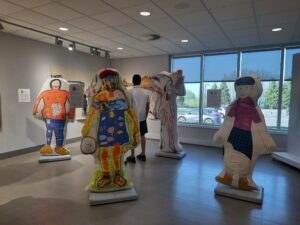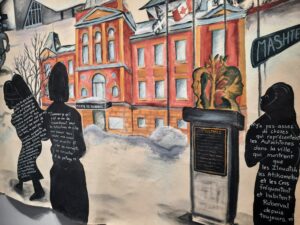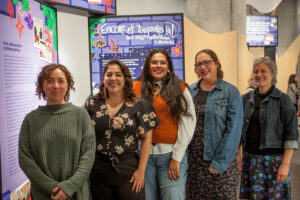
Looking for students or interns
Areas of expertise
Indigenous and non-Indigenous Relationships
- Associate Professor
- Co-director of Indigenous Studies program
- Co-director Villes Voix Visions
- Associate member of the INRS-UQAT Joint Research Unit | Indigenous Studies
Phone
514 499-4061
E-mail
stephane.gmarceau@inrs.ca
Urbanisation Culture Société Research Centre
385 Sherbrooke E.
Montreal, Quebec H2X 1E3
CANADA
Research interests
- Citizens’ relationships, exclusion/inclusion, inequality, collective actions, social movements;
- Social spaces and political places, contested spaces, local initiatives, self-determination;
- Indigenous women, Indigenous youth, urban spaces, colonial relations;
- Critical, feminist and decolonial approaches; Indigenous methodologies;
- Québec, Canada, Latin America.
Functions and biography
- Assistant professor, Department of geography, environment and geomatics, University of Ottawa, 2016-2017
- Post doctorate, School of community and Public affairs, Concordia University
- MSc in Geography, UQAM
- D.E.S.S. Territorial planification and local development, UQAM
- B.A in Political Science, Université Laval
- Répertoire de pistes d’actions pour re/tisser des relations entre Autochtones et non-Autochtones dans lesvilles du Québec: un partenariat pour autochtoniser la recherche et les espaces urbains CRSH Subvention développement de partenariat avec le Regroupement des centres d’amitié autochtones du Québec (RCAAQ) et l’Institut Ashukan
- Initiative CRSH sur la race, le genre et la diversité
Racisme et discrimination systémique envers les Autochtones au Québec :
Co-création d’outils de sensibilisation et de (ré)appropriation d’espaces urbains ;
Avec les mêmes partenaires - Cochercheuse du Labo Équité Climat
- Indigenous Women Storying and Interweaving their Experiences of Gendered and Colonial Violence in Mexico and Canada ; CRSH engagement de partenariat, co-chercheuse
Je te prête mes mocassins : parcours de femmes autochtones à RobervalDescriptionThe exhibition Je te prête mes mocassins : parcours de femmes autochtones à Roberval (in French only) encourages a personal connection. The stories and drawings of Mashteuiatsh women allow us to “put on their moccasins” and learn a little more about their personal journey and daily lives through their experiences of public spaces in Roberval. More than an exhibition, this knowledge mobilization tool is part of an awareness-raising process, emphasizing the historical roots of current issues and serving as a meeting place between Indigenous and non-Indigenous people. It is the result of collaborative research since 2022 by Puakuteu, Comité de femmes de Mashteuiatsh, and a team from Institut national de la recherche scientifique (INRS). The Ilnu and Atikamekw women involved in the research process carried out body mapping workshops and helped analyze the data collected. They expressed a desire to disseminate the results and use them as an awareness-raising tool. Through collaboration with Mosaïque Sociale, they created the exhibition using the materials developed during the research workshops and presented it at Musée ilnu de Mashteuiatsh between spring and fall 2024. Target audienceGeneral public |
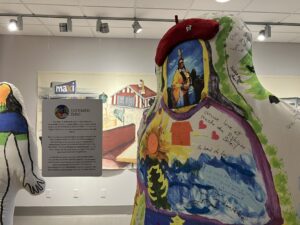
|
Encore et toujours là ! Des voix autochtones à Montréal (in French only)DescriptionThe exhibition Encore et toujours là ! Des voix autochtones à Montréal ran at Centre des mémoires montréalaises (MEM) from October 15, 2024, to February 23, 2025. It is the result of a multi-stage, collective effort by a number of people. This knowledge mobilization tool arises from two participatory research projects conducted with members of the Montreal/Tiohtià:ke Indigenous community between 2019 and 2023. The first one, led by Stéphane Guimont Marceau, focused on relations between Indigenous and non-Indigenous people in the city’s public spaces. It brought together eight people in a series of sharing circles and used the photovoice method to create an exhibition presented as part of the First Peoples’ Festival in summer 2021. The second research project, led by Marie-Eve Drouin-Gagné and Stéphane Guimont Marceau, brought together 18 young people (age 18 to 35) from the community around participatory mapping and led to the online publication of an interactive narrative map. Seven people from these two projects worked together on the design of the MEM exhibition. The approach was based on the sharing of individual stories, as well as discussions supporting a collective analysis of the issues raised. This research aimed to deepen our understanding of the relationships of Indigenous people with and in the city and to make their presence and experiences more visible. Target audienceGeneral public See the publication: Encore et toujours là ! |
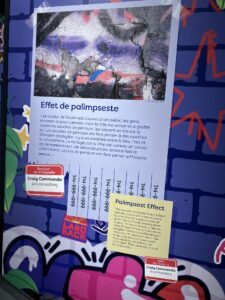
|
Confluences interactive map (in French only)DescriptionThis map shows the weaving, or confluence, of stories by Indigenous youth from Tiohtiá:ke/Moonyiang. Their individual stories come together to tell a collective story of Indigenous experiences in the city, like beads assembled into a beading project. The map is a non-georeferenced artistic representation of Montréal by Fabienne Théorêt Jérôme. Clicking on the flowers (themes) or petals (subthemes) plays excerpts from the stories shared by the young people who participated in the project. Target audienceGeneral public, including the population of Montréal. Co-construction or partnershipThe map is the result of a research project begun in 2019 with young people from the Montreal/Tiohtiá:ke Indigenous community concerning their relationships with and in the city. This collaborative research project used participatory mapping to share their stories, experiences, and knowledge of and in the city, while spurring collective analysis and the co-creation of new knowledge and perspectives. A total of 18 young people age 18 to 35 took part in the project through mapping workshops and semi-structured interviews. Two elders supported them during the workshops. The young people were from the Innu, Atikamekw, Kanien’kehá:ka, Anishinaabe, Dene, Waban-Aki, Wendat, Inuit, and Métis nations. A creative committee of nine young research participants was formed in fall 2021. Analysis of the stories collected was carried out in part by this committee. Project with Professor Marie-Eve Drouin Gagné. See the publication: Carte interactive Confluences |
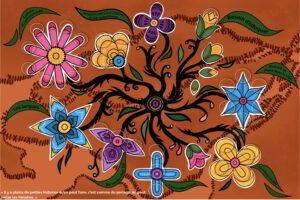
|
Publications
Book
Guimont Marceau, Stéphane. J.-O. Roy et D. Salée (eds). 2020. Peuples autochtones et politique au Québec et au Canada : citoyennetés, identités et autodétermination. Québec : PUQ.
Book chapters
Guimont Marceau, Stéphane et Jennifer Buckell. 2025. Histoire d’une relation et de ses vulnérabilités : entre constellation des savoirs et cérémonie de recherche. Dans Sylvain A. Lefèvre, Annie Camus et Sonia Tello Rozas (Eds) Savoir et Pouvoir : Justice épistémique et innovations sociales Québec : Presses de l’Université du Québec, Collection Innovation sociale. pp. 151-166.
Ibarra-Lemay, Alicia, Coralie Niquay, Jennifer Buckell, Stéphane Guimont Marceau et Marie-Eve Drouin Gagné. 2024. Ionkwakaratónnion ne onkwaká:ra (nous racontons nos histoires) : décoloniser la recherche en tressant un récit collectif. Dans Les jeunesses autochtones : décolonisation, fierté, mieux-être. Natasha Blanchet Cohen et Véronique Picard (eds) Québec : PUL.
Guimont Marceau, Stéphane, Alexandrine Sioui, Isaïe Nicolas Dubois Sénéchal. 2023. D’Idle no More au Principe de Joyce : une décennie de luttes autochtones au Québec. Chapitre 5. Dans L’état des mouvements sociaux au Québec. Publié par le CAPED. Montréal : PUM.
Guimont Marceau, Stéphane, Naomie Léonard et Raphaëlle Ainsley-Vincent. 2023. Entre villes colonialistes et villes autochtones, vers un changement de paradigme en études urbaines? Chapitre 6 Dans Sandra Breux et Meg Holden (Éds). Regards croisés sur les études urbaines au Québec et en Colombie-Britannique. Québec, Presses de l’Université Laval. Version anglaise : Crossing paths, crossing perspectives: urban studies in Quebec and in British Columbia.
Guimont Marceau, Stéphane. 2020. Territoires urbains et citoyenneté : une ambassade autochtone pour Montréal/ Tiohtià:ke. Dans S. Guimont Marceau, J.-O. Roy et D. Salée (eds) Peuples autochtones et politique au Québec et au Canada : citoyennetés, identités et autodétermination. Québec : PUQ.
Salée, Daniel, Stéphane Guimont Marceau et Jean-Olivier Roy. 2020. Peuples autochtones, territoires et citoyennetés: le Québec face à ses défis Dans S. Guimont Marceau, J.-O. Roy et D. Salée (eds) Peuples autochtones et politique au Québec et au Canada : citoyennetés, identités et autodétermination. Québec : PUQ.
Guimont Marceau, Stéphane. 2019. Actes de parole et dialogues pour des jeunes du Wapikoni mobile. Cinémas autochtones : des représentations en mouvement. Édité par Sophie Gergaud et Thora Herrmann. Paris : L’Harmattan : 101-117.
Peer-reviewed articles
Guimont Marceau, Stéphane. 2025. Quand les Autochtones réécrivent l’histoire ou comment se porte la réconciliation à Montréal. Revue d’études autochtones 53 (3) : 27-36.
Guimont Marceau, Stéphane et Marie-Eve Drouin Gagné. 2025. Appropriation spatiale et transgression de l’ordre spatial colonial par de jeunes Autochtones de Montréal/Tiohtà:ke. Mappemonde 139 https://doi.org/10.4000/146o4
Drouin Gagné, Marie-Eve et Stéphane Guimont Marceau. 2025. Contre-cartographie narrative avec de jeunes autochtones de Montréal/Tiohtiàk:e : «raconter» leurs récits pour replacer leurs territorialités dans la ville. Numéro spécial Cartographie autochtone édité par Benoît Éthier Revue d’études autochtones 53 (2) 49-60.
Drouin Gagné, Marie-Eve et Stéphane Guimont Marceau. 2025. Contre-cartographie narrative avec de jeunes autochtones de Montréal/Tiohtiàk:e : «raconter» leurs récits pour replacer leurs territorialités dans la ville. Numéro spécial Cartographie autochtone édité par Benoît Éthier Revue d’études autochtones 53 (2) 49-60.
Guimont Marceau, Stéphane, Marie-Eve Drouin Gagné et Ángela López Urrego. 2024. Des relations comme support des méthodes de recherche participatives : polylogue, cartographie et décolonisation. Sociologie et Société 54 (22) : 101-123.
Guimont Marceau, Stéphane, Jennifer Buckell, Marie-Ève Drouin Gagné, Raphaëlle Ainsley-Vincent, Naomie Léonard. 2023. Settler urbanization and Indigenous resistance: uncovering an ongoing palimpsest in Montréal’s Cabot Square. Urban History Review/Revue d’histoire urbaine 51 (2) : 310–333 doi: 10.3138/uhr-2022-0035
Léonard, N., Bucknell, J., Ainsley-Vincent, R., Drouin-Gagné, M.-E., et Guimont Marceau, S. 2022. Layers of settler urbanization and indigenous relational place-making: uncovering an ongoing palimpsest. Urban Geography, 44(2), p.281-283. doi:10.1080/02723638.2022.2129712
McClintock, N., et Guimont Marceau, S. 2022. Settler-colonial urbanisms: Convergences, divergences, limits, contestations. Urban Geography, 44(2), p.273-277. doi:10.1080/02723638.2022.2125663
Guimont Marceau, Stéphane et Patricia Martin. 2020. “Dialogue divides if it is not fair”: Québec First Nations’ youth call for responsive spaces of citizenship. Social and Cultural Geography 21 (6) : 767-787. Préédition électronique mise en ligne le 6 septembre 2018. doi: 10.1080/14649365.2018.1514648.
Guimont Marceau, Stéphane, Dolores Figueroa Romero, Vivan Jiménez Estrada et Roberta Rice. 2020. «Approaching violence against Indigenous women in the Americas from relational, intersectional and multiscalar perspectives » Revue canadienne des études latino-américaines et caraïbes / Canadian Journal of Latin American & Caribbean Studies 45 (1): 5-25. Préédition électronique mise en ligne le 29 novembre 2019. doi: 10.1080/08263663.2020.1690769. RAC.
Pelletier, Raphaël et Stéphane Guimont Marceau. 2019. « Territoire et actions collectives atikamekw nehirowisiwok dans l’espace médiatique québécois: légitimité politique ou persistance d’une vision coloniale? » The Canadian Geographer / Le Géographe canadien 63 (4) : 603-615. Préédition électronique mise en ligne le 1er juillet 2019. doi: 10.1111/cag.12543. RAC.
Guimont Marceau, Stéphane, Janice Cindy Gaudet, Véronique Audet, Marie-Josée Parent, Mélanie Lumsden et Jonathan Abitbol. 2017. Urban Indigenous cultural productions in Quebec: vital connections to cultural reconstruction. AlterNative: An International Journal of Indigenous Peoples 13 (2): 89-97. Préédition électronique mise en ligne le 13 avril 2017. DOI:10.1177/1177180117701026
Guimont Marceau, Stéphane. 2017. La vidéo autochtone : outil de réappropriation d’une autochtonie plurielle, Emerging forms of Indigeneity, Special edition The Journal of Urban Anthropology/ Revista de Antropologie Urbana 5(9): 79-87.
Guimont Marceau, Stéphane. 2013. Le Wapikoni mobile : conquête d’un nouveau territoire de citoyenneté pour de jeunes autochtones. ACME: An International E-Journal for Critical Geographies 12 (3).
Martin, Patricia et Stéphane Guimont Marceau, 2013. Introduction: Emergent forms of citizenship in Québec. ACME: An International E-Journal for Critical Geographies 12 (3).
Guimont Marceau, Stéphane et Pierre-Mathieu Le Bel. 2012. La spatialité du texte. Étude sur la réception de Des Morts qui dérangent. Espaces Temps.net.Textuel 02.04.2012
Guimont Marceau, Stéphane. 2010. Autonomie et développement en territoire zapatiste la participation citoyenne au cœur d’une expérience de résistance. Revue canadienne des études latino-américaines et caraïbes 35 (70).
Lévesque, Carole; Guimont Marceau, Stéphane. 2009. Les femmes autochtones Dans Portrait des Premiers Peuples au Québec – Recueil de textes no 1 : présentation générale. DIALOG. Le Réseau de recherche et de connaissances relatives aux peuple autochtones; Institut national de la recherche scientifique, Centre – Urbanisation Culture Société, Montréal.
Reports
Lévesque, Carole; Guimont Marceau, Stéphane. 2009. Les femmes autochtones In: Portrait des Premiers Peuples au Québec – Recueil de textes no 1 : présentation générale. DIALOG. Le Réseau de recherche et de connaissances relatives aux peuple autochtones; Institut national de la recherche scientifique, Centre – Urbanisation Culture Société, Montréal.
Other
Carte Confluences. Carte narrative en ligne https://www.carteconfluencesmap.com/
Sioui, Carling et Stéphane Guimont Marceau. 2023. Le design participatif : un outil pour visibiliser les récits autochtones dans le paysage urbain. Revue Urbanité printemps-été 2023.

